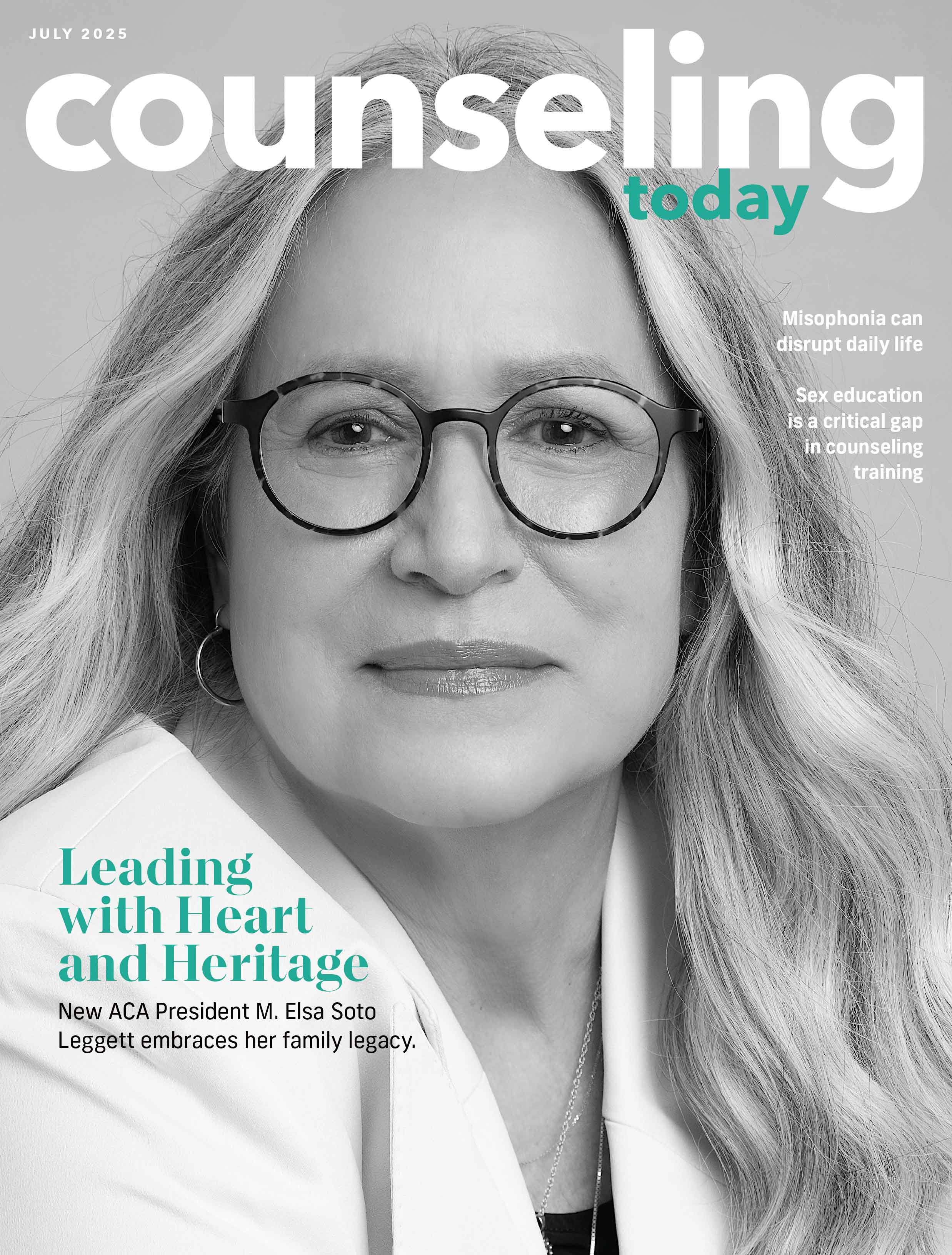Member Insights
Addressing problematic internet use with youth and families
November 2023

Making healthy decisions regarding our screen time and internet use can be challenging and often requires a fair amount of self-discipline. We may ask ourselves, “Why am I looking at my cellphone again?” or “Why did my screen time report go up by 15% this week?” Many families are struggling with these questions and are trying to find unique ways to manage their time online, so the counseling profession should be informed of research-based standards related to helping parents and caregivers with child and adolescent online usage.
Parents of young children and tweens often feel guilty and confused about childhood internet standards and whether it is OK to use screen time as a reinforcer for good behavior or to use the internet as a distraction so that the parents can focus on other tasks. Similarly, parents of teenagers often feel confused about when to give their teen or tween a personal cellphone, when to collect a teen’s phone or tablet so that they focus on homework, and how to discipline their adolescent for inappropriate internet use (e.g., viewing pornography, sharing personal content with strangers, engaging in online bullying).
Counselors may also experience some confusion as to what constitutes healthy and unhealthy internet use, what are appropriate age-based internet standards, what position parents should take in particular areas of adolescent internet use (e.g., pornography, social media, gaming) and how they can work with families to help reduce internet usage when it becomes a problem.
When I bring up the topic of appropriate internet usage in the family counseling class I teach every year, it is the contemporary issue that elicits the most controversy with counseling students representing different generations. Typically, the Gen Xers take a more conservative and concerned stance against excessive internet use, while the millennials and Gen Zers appear somewhat defensive over any criticism related to internet use. As a clinician and supervisor, I often notice the same patterns in clinical practice.
 Stephen V. Flynn is a professor of counselor education, a research fellow, the founding director of the marriage and family therapy program, and the play therapy program coordinator at Plymouth State University in Plymouth, New Hampshire. He is a licensed professional counselor (Colorado), a licensed marriage and family therapist (Colorado and New Hampshire), a national certified counselor, an approved clinical supervisor, an American Association for Marriage and Family Therapy (AAMFT) Clinical Fellow and an AAMFT Approved Supervisor.
Stephen V. Flynn is a professor of counselor education, a research fellow, the founding director of the marriage and family therapy program, and the play therapy program coordinator at Plymouth State University in Plymouth, New Hampshire. He is a licensed professional counselor (Colorado), a licensed marriage and family therapist (Colorado and New Hampshire), a national certified counselor, an approved clinical supervisor, an American Association for Marriage and Family Therapy (AAMFT) Clinical Fellow and an AAMFT Approved Supervisor.
Opinions expressed and statements made in articles appearing on CT Online should not be assumed to represent the opinions of the editors or policies of the American Counseling Association.
The potential dangers of internet use
Internet addiction is marked by extensive and constant use of the internet despite negative consequences. It should be noted, however, that despite being widely researched and experienced, internet addiction is not a formal diagnosis in the Diagnostic and Statistical Manual of Mental Disorders. Nevertheless, it’s important that counselors understand the nuances of internet addiction given the prevalence of technology in modern life. According to Najah Almukhtar and Saad Alsaad in a 2020 article published in the Journal of Family Medicine and Primary Care, signs of this behavioral addiction include:- A loss of control that eventually leads to distress due to spending an excessive amount of time engaging in recreational internet use (e.g., visiting social media sites, surfing the web for information, gaming)
- Cravings when not using the internet
- Planning and preoccupation about internet use when not online
- Functional impairment in daily life
- A variety of potential physical concerns (e.g., obesity, poor eyesight, carpal tunnel syndrome, headaches, dry eyes, poor sleep patterns, backaches)
Establishing healthy boundaries with internet use
Problematic use of the internet has the potential to devastate lives and cause significant distress within youth and families. Yet excessive, dangerous and illegal internet behavior remains largely unregulated by the government, and the monitoring and responsibility of appropriate child and adolescent use fall to parents and caregivers. Counselors are in a unique position to support youth and parents when it comes to issues related to the internet. There are a wide range of potential modalities, theories and interventions to assist in problematic internet use. Parent counseling, family counseling, cognitive behavior therapy, reality therapy, family meetings, psychoeducation, collaborative homework, motivational interviewing and the use of third-party parental control apps are useful in exploring or reducing screen time usage and for protecting youth from potentially harmful sites and images. Psychoeducation centered on educating families on the potential negative effects of excessive screen time use can be extremely important. Counselors can broach this topic when discussing family rules for internet use. For example, the following conversation is a hypothetical parent counseling exchange between a practitioner and two parents (Lisa and Frederick) who are concerned about their children’s screen use. Although this example is focused on a parent counseling experience, a similar conversation could take place during a family counseling session or during a parental consultation session. Counselor: You are fearful that screens are serving as a substitute for parenting. I wonder if you’ve considered creating boundaries around when your children are permitted to use their cellphones.Lisa: I think that’s a great idea. Frederick: Right now, we don’t have anything formal in place, and their grades are poor. Counselor: A good area to start is discussing when they should put their devices away. Lisa: The two older boys typically start homework around 7 p.m., so that would be a good time to collect their cellphones. Counselor: When would you give them their phones back? Lisa: Before they head off to school. Frederick: Let’s say 7 a.m. Counselor: Some families have different screen time rules for the weekends. What are your thoughts? Frederick: I think they can have their phones at 5 p.m. on the weekend. We can collect them before they go to bed. Lisa: Agreed.There is general agreement that complete avoidance of the internet should not be the goal of treatment. The goals should be more in line with helping parents and youth use the internet safely and responsibly and find a sense of balance and control with using the internet. Counselors can provide families with referral sites, such as the Center for Internet Addiction and the Center for Internet and Technology Addiction, that provide helpful information and support on technology use. Screen time issues can also be addressed in a collaborative family homework assignment. In the example of Lisa and Frederick, the counselor may work with them to establish a plan for screen use and ask them to implement it at home:
Counselor: It sounds like the family is continuing to consider a healthier screen time schedule. Lisa: Yes, do you have any suggestions for us? Counselor: It sounds like you have already created an initial setup. The two older brothers, Philippe and Anthony, have agreed to curb their usage and increase their homework time by handing in their cellphones at 7 p.m. every weekday evening. Frederick: That would work for the two teenagers, but what about Ariel? Counselor: As a 5-year-old, Ariel doesn’t really need much screen time, and it isn’t all that healthy for her. The previous discussion centered on allowing her to watch weekend cartoons and one movie. Lisa: Sounds like we have a plan. Frederick: Sounds fine. Counselor: OK, let’s agree to follow these standards for the upcoming week. During our next session, I’ll check in to see how it all went.Parents and caregivers often worry how internet use may affect children’s safety, mental and physical health and social development. These example conversations illustrate how counselors can help caregivers establish healthy, age-appropriate rules regarding internet and screen use and facilitate productive conversations when their child witnesses something disturbing such as extreme violence or pornography.
Considering the clients’ developmental level
Counselors must consider the clients’ development level and needs when assessing and treating problematic internet use. When working with adults, counselors should educate them on the addictive nature of the internet, increase awareness around how internet use is affecting their life (e.g., career, relationships, happiness, finances), reduce any shame or blame related to internet use, explore alternative non-internet activities and encourage the person struggling with problematic internet usage to find coping skills and a safe person to talk with (other than the counselor). Unlike children and adolescents, adults often have a much greater capacity for personal responsibility, introspection, self-awareness and self-discipline. This is an important factor to consider when collaborating on out-of-session work related to issues such as reducing screen time and refraining from engaging in certain websites. Counselors who specialize in working with children, however, should recognize that issues such as awareness, personal responsibility, introspection, self-discipline and difficulty resisting the addictive nature of the internet can serve as barriers to children limiting their own internet use. If possible, counselors should ensure that parents and caregivers are part of the treatment. This can come in the form of weekly or biweekly parental consultations or periodic check-ins. During these meetings, parents can discuss strategies and goals for reducing screen time. Counselors should also empower parents to create rules that promote healthy screen time usage. General guidelines on children’s media use and family tools can be found on the American Academy of Pediatrics website and on the World Health Organization’s website. Counselors should remind parents that the shape and scope of internet usage changes for adolescents and that parental flexibility is key. Screen time for teenagers often includes doing schoolwork and projects, watching TV shows, streaming videos, creating art or music online, gaming, connecting with peers via social media and watching fast stimulation online content (e.g., TikTok). Because a lot of teenagers’ screen use involves addictive mediums such as apps, gaming and social media, parents should recognize that their adolescent children can be tempted to spend far too much time online. This heavy usage can cause a variety of negative consequences, such as sedentary lifestyle, obesity and mental health issues. Establishing healthy rules around technology can be challenging because families often include youth living together who are of different ages and at different developmental levels. Counselors can help parents balance general household standards and rules (e.g., no pornography, no computers after 9 p.m.) with more specified internet usage rules relevant to each child’s developmental level. Although many internet-based parenting issues and supervision concerns can be solved if computers are kept in a common area, this might not be possible for older teenagers who require more independence and have personal cellphones. Counselors may feel overwhelmed with the balance of encouraging developmentally appropriate independence and helping parents with household expectations regarding devices. While there is no quick and easy solution to this issue, working with families to try to have achievable expectations and to blend family rules with individually tailored expectations appears to be key to long-term therapeutic success. Issues involving inappropriate internet use, screen time standards and protection from individuals who exploit youth online are not new concerns. Counselors need to be aware of the various issues and problematic behavior that can affect those who are addicted to or abuse the internet. Our efforts as counselors should be centered not only on openly exploring and processing these concerns but also on actively engaging with individuals, families and communities to develop standards for healthy internet use.////
Learn more about working with families on issues related to internet use in Flynn’s latest book, The Couple, Marriage, and Family Practitioner: Contemporary Issues, Interventions, and Skills. This comprehensive guide examines contemporary issues, theories, interventions and skills related to working in the interrelated fields of family, couple and child-based counseling.
 Stephen V. Flynn is a professor of counselor education, a research fellow, the founding director of the marriage and family therapy program, and the play therapy program coordinator at Plymouth State University in Plymouth, New Hampshire. He is a licensed professional counselor (Colorado), a licensed marriage and family therapist (Colorado and New Hampshire), a national certified counselor, an approved clinical supervisor, an American Association for Marriage and Family Therapy (AAMFT) Clinical Fellow and an AAMFT Approved Supervisor.
Stephen V. Flynn is a professor of counselor education, a research fellow, the founding director of the marriage and family therapy program, and the play therapy program coordinator at Plymouth State University in Plymouth, New Hampshire. He is a licensed professional counselor (Colorado), a licensed marriage and family therapist (Colorado and New Hampshire), a national certified counselor, an approved clinical supervisor, an American Association for Marriage and Family Therapy (AAMFT) Clinical Fellow and an AAMFT Approved Supervisor.
Opinions expressed and statements made in articles appearing on CT Online should not be assumed to represent the opinions of the editors or policies of the American Counseling Association.


